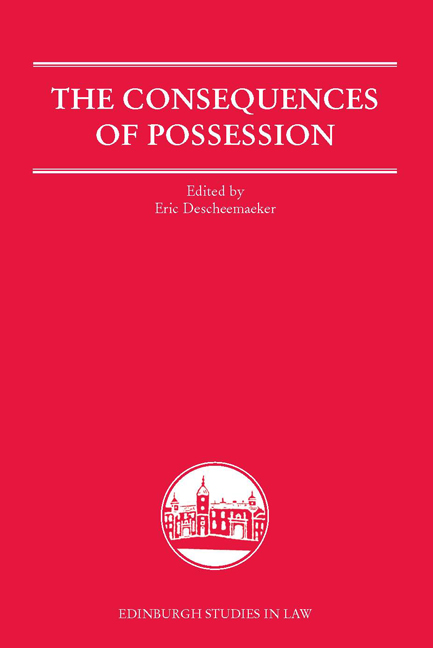Book contents
- Frontmatter
- Contents
- Foreword
- List of Contributors
- Table of Cases
- Table of Statutory Materials
- 1 The Consequences of Possession
- 2 Why Protect Possession?
- 3 Is Possession Factual or Legal?
- 4 Possession as a Source of Property at Common Law
- 5 The Evolution of Possessory Actions in France and Italy
- 6 The Protection of Possession in Scots Law
- 7 Possessio civilissima in Spanish and German Law: Protecting Possession between Fact and Fiction
- 8 Possession of Incorporeals
- 9 The Protection of Quasi-Possession in South African Law
- Index
2 - Why Protect Possession?
Published online by Cambridge University Press: 07 December 2017
- Frontmatter
- Contents
- Foreword
- List of Contributors
- Table of Cases
- Table of Statutory Materials
- 1 The Consequences of Possession
- 2 Why Protect Possession?
- 3 Is Possession Factual or Legal?
- 4 Possession as a Source of Property at Common Law
- 5 The Evolution of Possessory Actions in France and Italy
- 6 The Protection of Possession in Scots Law
- 7 Possessio civilissima in Spanish and German Law: Protecting Possession between Fact and Fiction
- 8 Possession of Incorporeals
- 9 The Protection of Quasi-Possession in South African Law
- Index
Summary
The civil and common laws’ respective approaches to possession are often contrasted. While the civil law draws a neat distinction between the right of ownership and the fact of possession, the common law tends to relate possession to ownership by considering that possession confers a title that is valid against anyone who cannot demonstrate a better claim to it. Despite some differences between the approaches to possession in the two legal traditions, I have proposed a notion of possession that is reconcilable with both traditions, conceiving possession as a mode of communication to third parties. This paper pursues that line of enquiry by studying the consequences of possession. It aims to contribute to the discussion on the vocation and scope of the application of possessory protection through studying the example of Quebec, complemented by comparative insights drawn from French civil law as well as English and Canadian common law.
The main objective of this paper is to examine the legitimate parameters of possessory protection by adopting a theoretical and comparative approach. Following the examination of the notion of possession and the justifications for its protection, I submit that the person with detention of the property should benefit from possessory protection. When it comes to the qualities of possession required for a possessory action, I argue that such action should not be subject to the conditions developed for “useful” possession. Applying these conditions to a possessory action confuses the concepts of possession and acquisitive prescription and undermines the justifications for possessory protection. Taking into account the increasing economic significance of movables, I finally submit that the domain of possessory protection should be extended in order to include movable property.
While possession may primarily be a mode of communication to third parties, its role should not be limited to that of an accessory to ownership. This paper studies the effects of possession in relation to its functions and justifications. In civil law, the consequences of possession are often treated as unitary, although they do not all carry out the same functions. Some effects of possession, such as acquisitive prescription, are linked to ownership; others, however, are not. Indeed, the possessory action, traditionally distinguished from the petitory action, has a larger function than the protection of ownership insofar as it also aims to protect against violence.
- Type
- Chapter
- Information
- The Consequences of Possession , pp. 30 - 55Publisher: Edinburgh University PressPrint publication year: 2014

